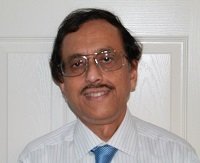Supriyo Bandyopadhyay is Commonwealth Professor at Virginia Commonwealth University and directs the Quantum Device Laboratory in the Department of Electrical and Computer Engineering. He received his bachelor's degree from the Indian Institute of Technology, Kharagpur, India, M.S. degree from the Southern Illinois University in Carbondale, and his Ph.D. from Purdue University, West Lafayette, Indiana. He was a Visiting Assistant Professor at Purdue, Assistant and Associate Professor at University of Notre Dame, Professor at University of Nebraska-Lincoln and now Commonwealth Professor in the Department of Electrical and Computer Engineering at Virginia Commonwealth University with a courtesy appointment as Professor of Physics. Dr. Bandyopadhyay's research is in spintronics, straintronics, energy-efficient computing and nanoscale self-assembly. His self-assembly work was featured in the U.S. Army Research Office Nanoscience Poster in 1997 as one of four notable advances in nanotechnology. Prof. Bandyopadhyay was named Virginia’s Outstanding Scientist by Virginia's Governor Terence R. McAuliffe in 2016. His alma mater, the Indian Institute of Technology, Kharagpur, India named him a distinguished alumnus in 2016. His university bestowed upon him the Distinguished Scholarship Award (given annually to one faculty member in the university) and the University Award of Excellence (the highest honor the university can bestow on a faculty member, given to one individual in a year). His department gave him the Lifetime Achievement Award for sustained contributions to scholarship, education and service (one of two given in the department's history). His earlier employer, University of Nebraska-Lincoln, conferred on him the College of Engineering Research Award (1998), the College of Engineering Service Award (2000), and the Interdisciplinary Research Award (2001). In 2018, he received the State Council of Higher Education for Virginia Outstanding Faculty Award. This is the highest award for educators in private and public universities and colleges in the State of Virginia and recognizes outstanding scholarship, teaching and service. In 2020, he received the Institute of Electrical and Electronics Engineers (IEEE) "Pioneer in Nanotechnology" award. Prof. Bandyopadhyay has authored and co-authored over 400 research publications and presented over 150 invited talks and colloquia across four continents. He has also authored/co-authored three textbooks. He has taught in India under the GIAN program and performed collaborative research there with a VAJRA fellowship from the Government of India. Prof. Bandyopadhyay is a Fellow of IEEE, American Physical Society, Institute of Physics (UK), the Electrochemical Society, and the American Association for the Advancement of Science.
USAID Profile
Bureau for Europe and Eurasia
Energy and Infrastructure Division
Professor Bandyopadhyay is the Jefferson Science Fellow with the USAID Bureau for Europe and Eurasia's Energy and Infrastructure Division. The division works with partner countries in the western Balkans, as well as the Black Sea and the South Caucasus regions, to modernize their energy systems through the diversification of energy resources, energy efficiency improvements, induction of new technologies, development of a local workforce, and safeguarding the energy infrastructure from cyberattacks and malign influences. Professor Bandyopadhyay brings his expertise in electrical and computer engineering and energy-efficient system design to the division's programs. He will assist the office with current programs in energy efficiency and cybersecurity, as well as help them to design new strategies and programs for the region, focusing on the design and launch of the Bureau's first ever critical infrastructure cybersecurity program.
|




